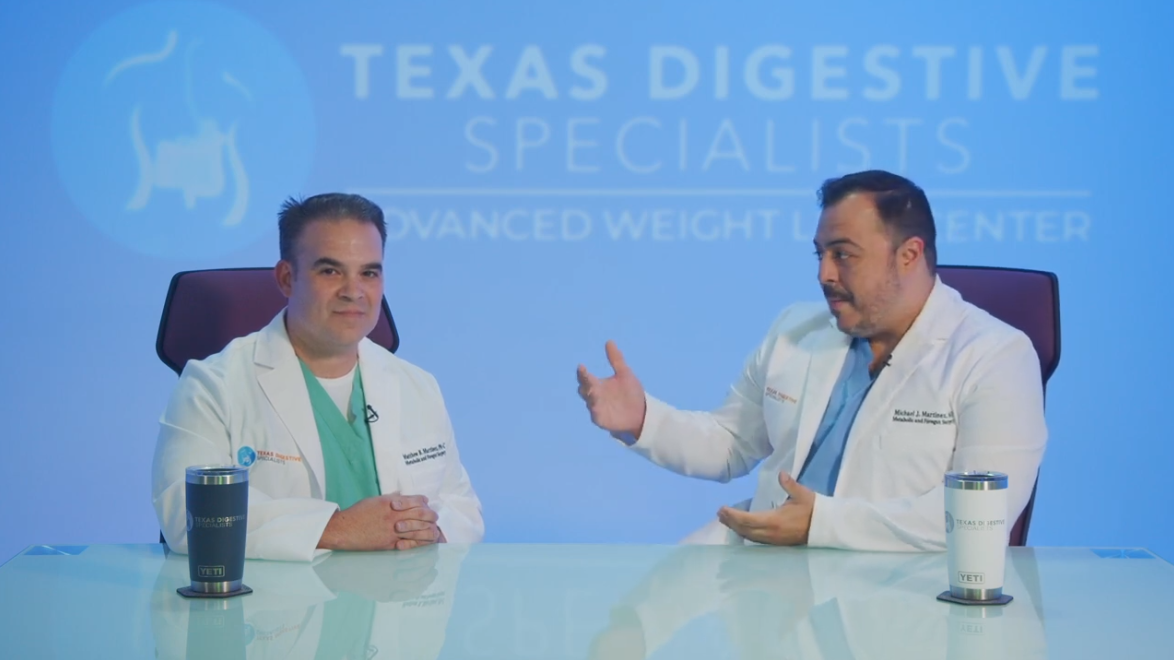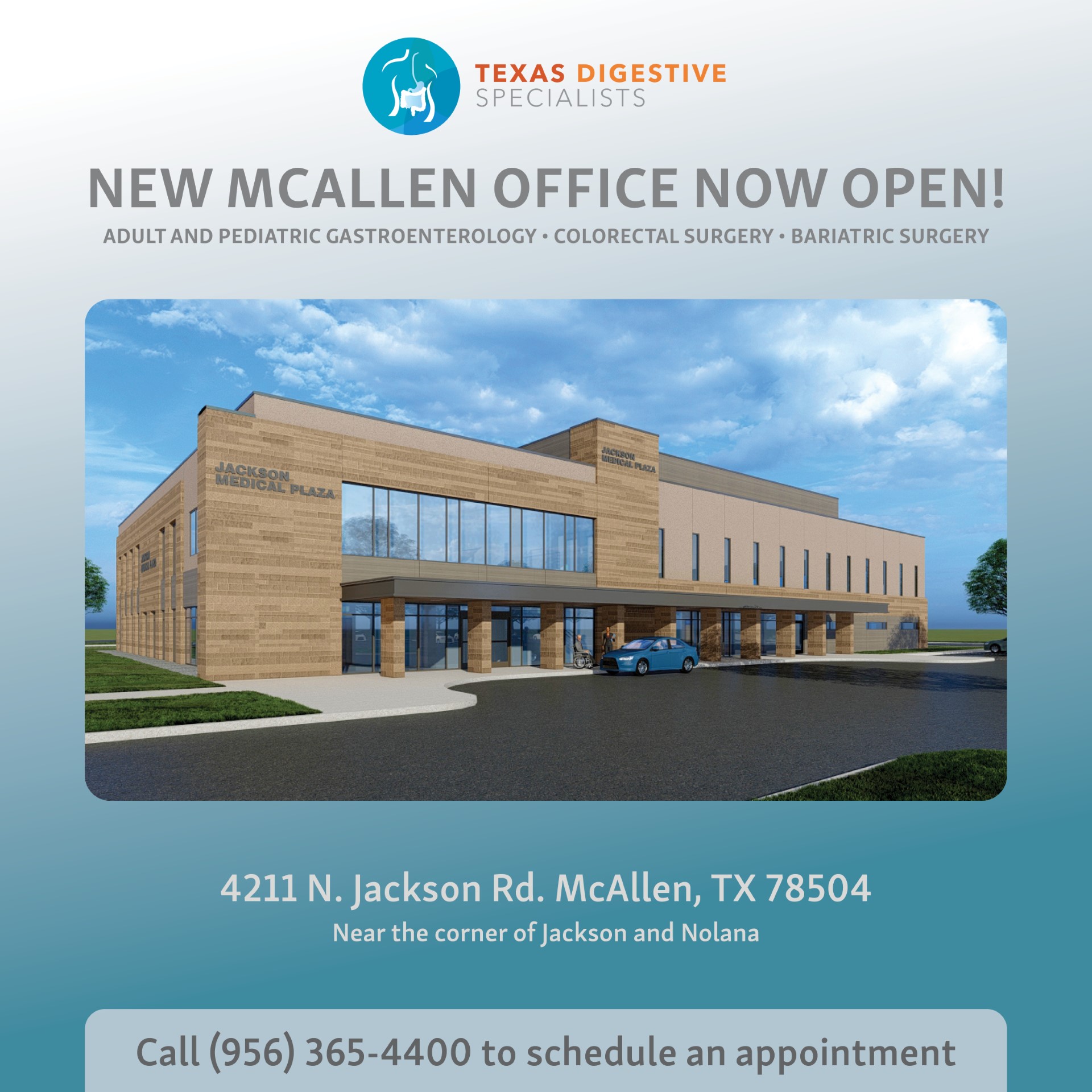Hello. My name is Michael Martinez. I’m a bariatric and foregut surgeon at the Advanced Weight Loss Center at Texas Digestive Specialists. Today, I’m joined by my physician, assistant and brother, who actually is a first surgical assistant in the operating room, as well as works for me in the clinic, Matthew Martinez. We’re here together to help you figure out whether you could be a candidate for weight loss surgery.
So one of the common questions that we always get is. Who is the candidate for bariatric surgery?
And that’s really the starting point. So I should tell you, there’s some new recommendations that have just come down the pike. And this is brand new information. It’s still something that insurance companies have not yet adopted. But typically, if a patient has any medical issues associated with being overweight, then they should be considered for weight loss surgery.
But there are certain stipulations on insurance companies paying for those patients to go through with surgery. So we know there are certain medical requirements. And what has happened here recently, the new recommendations have come down to the patients at a lower weight should be considered for weight loss surgery. And the reason is that surgery has become so much safer in recent years.
We now do things with minimally invasive techniques. We do things with small incisions, putting cameras inside the patient. And most patients are actually in and out of the hospital within a day or two. And because of the increase in safety and now better understanding of the benefits of surgery, candidates should be considered at a lower weight.
The specifics are unique, sometimes the different individual insurance plans. And so that’s something that we can talk about in the office. But if you have any question that weight may be affecting your quality of life or your medical conditions, you should come see us. Another question that I often get from patients is to tell them about the benefits of weight loss surgery and losing weight through bariatric surgery. And I think that’s something that you get as well because you work with our patients both in the preoperative setting as well as in the post-operative setting.
The benefits are many. From simple things like bending over to tie their shoelaces, walking up and down stairs, patients ability to take medications for things like diabetes and high blood pressure. All those things can go away. Medical problems that are chronic become easier to deal with. Even things like sleeping become easier.
I used to emphasize when I would have these conversations with patients about the increase in life that’s been studied, it’s very well documented that any patient that goes through bariatric surgery tends to have a longer life span on average than people that they’re compared to. But it went away from that actually, after a patient who had very serious chronic back pain and multiple back operations on their spine.
She reprimanded me when I was talking to her about living longer “I don’t want to live any longer than I have to, I just want to have a better quality, lower pain life for the rest of my days”. And it really changed my perspective to understand what is so important to the patients from a benefit standpoint is that every day benefit that you spoke of, being able to tie your shoes is easier. being able to get in and out of a booth at a restaurant, being able to fly on a plane and fit in the plane seat, all these things that a lot of people take for granted that affect your everyday quality of life. Those things, I find are far more important than the number of blood pressure drugs that you may be getting rid of, although those things are very important as well.
You know, another question we get is, which is the best weight loss surgery, which is the weight loss surgery for me. In our office, we do two different ones. We do sleeve, we do bypass.
And actually, that’s part of a spectrum of weight loss procedures that we offer. So sleeve and bypass are the predominant and most popular procedures for the vast majority of patients. But what is really important to understand is if you’re going to go through a surgical process, you need an individualized surgical process. This is a medical treatment like any other.
The analogy I like to use is if somebody is getting treatment for their cancer, let’s use the example of breast cancer. Some patient may go to surgery first, may come back with radiation afterwards or chemotherapy. Some patient may start with radiation or chemotherapy and then go to surgery. Some may not need surgery at all. It’s very individualized.
And then you can have recurrences of the cancer that would cause another round of treatments. Well, in the case of bariatric surgery, it’s important to understand medical conditions, age , lifestyle and what previous surgeries patients have had. All of these things affect our decision making on what’s the right kind of procedure. So even though sleeve and bypass are currently the most popular surgeries, there’s a whole spectrum of treatments that are offered, including even non-surgical weight loss.
And sometimes we have candidates that are more appropriate for something like that. Let’s talk a little bit about the process for bariatric surgery, because inevitably it comes up. Okay, well, now I think I might be a candidate. I think I want to have those benefits in my life. What are the actual steps I have to take or what does it entail? Can I just decide to get surgery today and then go get surgery tomorrow? And we know that it’s not that simple.
No, it’s not. But you alluded to it, too. So even offering things like nonsurgical weight loss. What I recommend is if anyone wants to have weight loss surgery or just is considering weight loss, you can come into the clinic. If you do not have benefits, then we can do non-surgical weight loss, including things like medications. But if you are going to have surgery, what you need to know is that our staff is there to work with you from the very beginning.
By making sure you have insurance, insurance coverage, and make sure all the visits like cardiology, pulmonary, and everything needed to get you cleared for surgery. Make sure that those things happen as they should. Our staff is there to back you up.
It’s really important because this is a process and oftentimes insurance companies will put in very specific requirements for you to get through the process if they’re going to be contributing to the the payments on the surgery. And so what that can entail for us always as kind of a baseline, is checking out your overall health through labs, through cardiology and pulmonary visits. Which is looking at the lungs and function of the lungs.
We oftentimes will have you see a dietician as well. That way you learn how to eat before, during and after the procedures. Everybody is required to see a psychiatrist as well. That’s an integral part of the process so that we can make sure you don’t have any eating disorders, any addiction issues or things that can rear their heads long term after the procedure and make it not as safe for you.
And the other part of it is a check on the anatomy, which we usually do through endoscopy. So putting a scope down and taking a look at the actual stomach and the organs that are going to be operating on. We want to make sure there’s nothing there that’s going to alter our ability to do the surgery. However sometimes we use imaging or other modalities depending on the specific needs of the patient.
If this is a topic that interests you for health reasons. Or a family member of yours that you think might get some benefit. We in Texas, Digestive Specialists and specifically the Advanced Weight Loss Center are here to help you. We work as family. We treat you like family. And we understand this is a lifelong disease process. So thank you for joining us today and we will see you next time.


